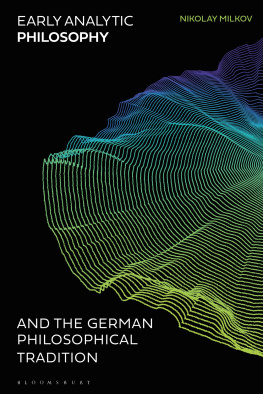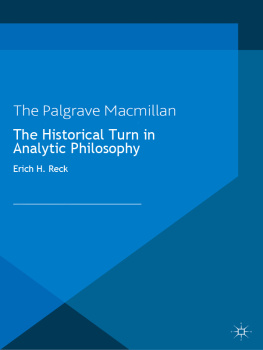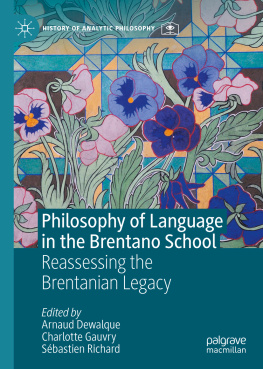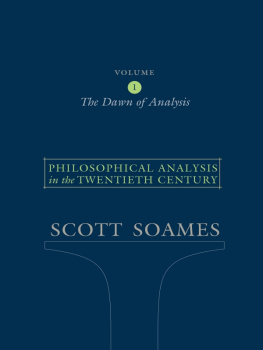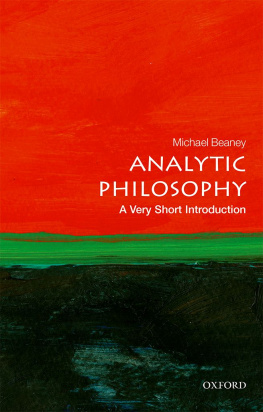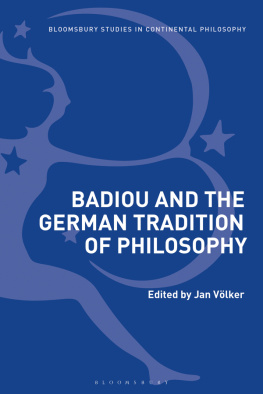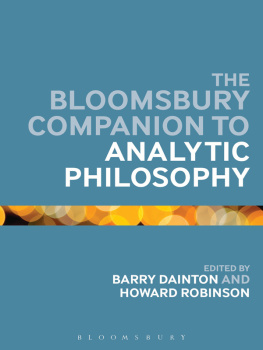Early Analytic Philosophy and the German Philosophical Tradition
Also available from Bloomsbury
Kants Transition Project and Late Philosophy , by Oliver Thorndike
Portraits of Wittgenstein , edited by F.A. Flowers III and Ian Ground
The German Idealism Reader , edited by Marina F. Bykova
The History of Philosophical and Formal Logic , edited by Alex Malpass and Marianna Antonutti Marfori
Early Analytic Philosophy and the German Philosophical Tradition
Nikolay Milkov

Contents
Versions of each chapter, excepting the first, have earlier appeared in print in the following order: A logicalcontextual history of philosophy, Southwest Philosophy Review 27:1 (2011), 219; A new interpretation of Leibnizs concept of characteristica universalis , in Hans Poser (ed.), Einheit in der Vielheit , Proceedings of the 8 th international Leibniz-congress , Hannover, 2006, 60614; Frege and the German philosophical idealism, in Dieter Schott (ed.), Frege: Freund(e) und Feind(e) , Berlin: Logos Verlag, 2015, 88104; Lotze and the Cambridge analytic philosophy, Prima philosophia 13 (2000), 13353; Lotzes debt to Russell, Studies in History and Philosophy of Science, Part A , 39 (2008), 18693; Lotzes concept of states of affairs and its critics, Prima philosophia 15 (2002), 399414; Russell and Husserl (19051918): The Not-So-Odd-Couple, in Peter Stone (ed.), Bertrand Russells Life and Legacy , Wilmington (DE): Vernon Press, 2017, 80104; The formal theory of everything: explorations of Husserls theory of manifolds ( Mannifaltigkeitslehre ), Analecta Husserliana 88 (2005), 11935; What is Analytical Phenomenology?, Analecta Husserliana 59 (1999), 4918; G. E. Moore and the Greifswald objectivists on the given, and the beginning of analytic philosophy, Axiomathes 14 (2003), 36179; Karl Poppers debt to Leonard Nelson, Grazer philosophische Studien 86 (2012), 13756; L. Susan Stebbings criticism of Wittgensteins Tractatus , Vienna Circle Institute Yearbook 10 (2003), 35163. I am grateful for permission to use material from these articles.
The material adapted from the works listed above has been corrected, revised, and recast to suit the unified aims of this new book, aims that took shape through several of my courses at the University of Paderborn, Germany. Those same aims served as the organizing theme of Early Analytic Philosophy in Context, a graduate seminar that I offered in the Spring Term 2012 as the Bertrand Russell Visiting Professor at McMaster University, Ontario. Material that became part of this study was further developed in a course titled Early Analytic Philosophy and the German Philosophical Tradition, which in Fall of 2018, I taught at the invitation of the University of St. Petersburg, Russia. Additionally, content from several of this books chapters was presented at a number of professional meetings and workshops, to whose participants I owe a debt of thanks for valuable critical input and helpful suggestions. Thanks go also to all my colleagues, students, and friends who have encouraged and supported my work over the years, and in particular to Dr. Phillip Stambovsky (Fairfield University), who helped me improve the language of the book. I am also thankful to Mrs. Lilli Isabel Frster who did an excellent work of preparing the index. Most of all, however, I thank my wife Michaelafor her constant encouragement and inspiration.
I began to think about writing this book during my sjour as a Visiting Fellow at the Centre for Philosophy of Science, University of Pittsburgh, in 20056. While at Pittsburgh I had the opportunity to sit in on Mark Wilsons class on Scott Soamess history of analytic philosophy (2003), and I attended seminars by Tom Ricketts on Frege and John McDowell on Wilfrid Sellars. What struck me above all was the profound influence that W. V. Quine has had on American philosophers and the central role that the problem of analyticity plays in that legacy. Quines influence has led many American historians of analytic philosophy to choose the analytic/synthetic distinction as their starting point.
Breaking with this historical paradigm, the present book investigates the emergence and development of early analytic philosophy as an orientation to problems that originated within a particular historical context. Specifically, the study sheds light on the Germanophone roots of the early analytic philosophy associated with the Cambridge philosophers G. E. Moore, Bertrand Russell, and, later, Ludwig Wittgenstein. We shall find that many of the issues that preoccupied this school were familiar to the most renowned figures in the German philosophical tradition and addressed by them in profoundly original and enduringly significant ways.
The aim in these pages is to trace how particular problems and concepts that exercised the early analytic philosophers were closely connected with, and in many cases, hinged upon, the thinking of German philosophers and logicians of the first rank, from Leibniz to Lotze and Husserl, and even to thinkers conceived as antipodal to analytic philosophy, such as Hegel. Restricting itself mainly to these major thinkers, this study does not cover the relatedness of other important figuressuch as Bolzano, Fechner, Herbart, von Helmholtz, Brentano, Ernst Mach, and Meinong to the early analytic philosophers. The two exceptions are Johannes Rehmke and Leonard Nelson, whose proto-analytic philosophy, unlike that of Bolzano, Brentano, and the rest, is little known, especially among Anglophone students of the movement.
The unheralded hero of the present study is Hermann Lotze. Still underappreciated, Lotzes philosophy stands out for how it successfully synthesizes elements of scientifically oriented German philosophy of the mid-nineteenth century with the thought of classical German idealism. Beyond being a seminal factor in the rise of analytic philosophy, Lotzes influence proved formative in phenomenology as well; his thinking informs key points of similarity between early analytic philosophers and Husserl, which I explore in Part Four of this book. Such a discussion is of particular historical value since for a considerable time, especially in the 1960s and 1970s, students of analytic philosophy and phenomenology regarded the two movements as antithetical. While, to be sure, recent years have seen growing recognition of the relation between these philosophical movements, a host of historically significant and also surprising connections remain to be disclosed and developed.
While seminally influential, however, German school philosophy ( Kathederphilosophie ) had a complex and in some respects problematic impact on nascent Cambridge analytic philosophy. This is only to be expected seeing that early analytic philosophy was embedded in differentin the Britishphilosophical tradition. As a result, the pioneers of the Cambridge school formulated positions that often stand at odds with those of analytic philosophy as it took shape in Germanophone authors. I discuss these differences in Part Six.
This study builds upon my work English Philosophy in Context which I originally defended as a Habilitationsschrift (second dissertation) at the University of Paderborn in 2009. Over the years, this work has matured and expanded through investigations into two important yet largely undeveloped and often misunderstood areas in the history of analytic philosophy. One is the history of logical empiricism (Milkov 2011, 2013a, 2015a)my interest in it aroused during my stay in Pittsburgh. My investigation of this realm revealed that the Berlin Group around Hans Reichenbach, active between 1928 and 1933, which also included the young Carl Hempel, had a rather different orientation to the philosophy of science than that of the more famous Vienna Circle. Briefly put, the Berlin Group allied itself more closely with nineteenth-century German philosophy of science, in particular with Jakob Friedrich Fries and also with Leonard Nelson (Chapter 13). In consequence, unlike the Vienna Circle, the Berlin Circle did not champion positivism. This finding made it clear that logical empiricism is a kind of analytic philosophy that is patently different from the early analytic philosophy of G. E. Moore and Bertrand Russell (2013a: 26 ff.).

